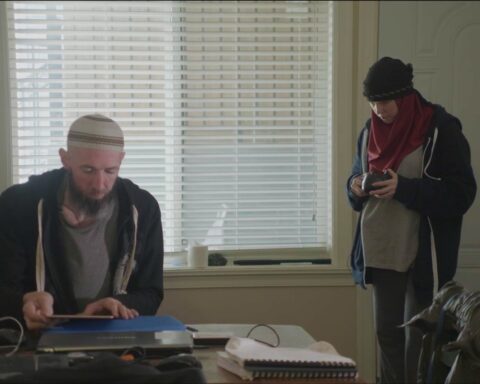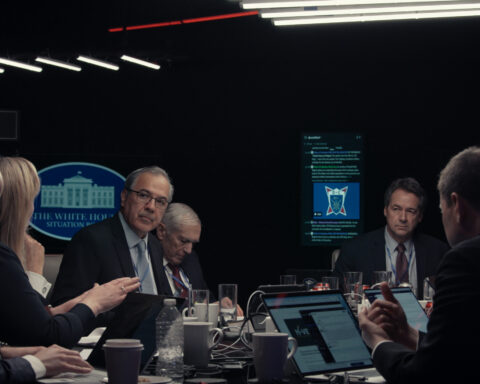This article is published as part of an exchange with DOX, the European Documentary Magazine.
Encirclement: Neo-liberalism Ensnares Democracy, is an intellectual documentary by the Canadian filmmaker Richard Brouillette—160 minutes long, shot in black-and-white on 16 mm. It’s based on thirteen “talking heads,” long monologues with intertexts like in a silent movie—Brouillette insisted on using this instead of the usual voice-over.
It is relevant, because today’s financial crisis makes it urgent to understand why and how neo-liberalism has changed the situation of the West. Encirclement is not your run-of-the-mill film about the globalization of the economy, but about mind control, brainwashing and ideological conformism. Brouillette tells us it’s “about the omnipresent irrefutability of a new monotheism, with its engraved commandments.” The film title “encirclement” is a concept from military strategy, as practised by Alexander the Great and Napoleon: surround the enemy and eliminate the possibility of escape.
The film focuses on a dozen people, all men but for one woman, who one by one, like a jury, pass verdict on the ideology and consequences of neo-liberalism. But why didn’t Brouillette with seven years of work use almost no “visual lubricants”—like archival or illustrative film images? In a way, the absence intensifies your concentration on what’s actually being said. But can you maintain your focus for nearly three hours? Yes, in steps of increasing importance, we interestingly learn about how neo-liberalism has imposed its dictates on the world.
***
Encirclement was influenced by Le Monde diplomatique’s former editor Ignacio Ramonet’s editorial La Pensée Unique [the doctrinaire approach] in 1995. In Brouillette’s film he talks about “globalitarian” regimes. But the film’s most important points come from Noam Chomsky, US linguistics professor and fierce critic of US imperialism: he refers to economic theorist David Ricardo of two centuries ago, on the comparative advantage. His theory is that local products can be produced better and cheaper locally, and exchanged with products from other countries, as exemplified by Brits buying wine from Portugal and the Portuguese buying wool from the United Kingdom. Ricardo meant that markets “invisibly” or harmonically could regulate themselves, where nation states peacefully kept their local competitive advantages.
But as Chomsky points out, this is not today’s reality, and never was. The exchange of goods did not start locally in villages, then in cities, and then between nations. For the most part, commerce followed in the steps of militarization. Colonies were forced to accept the rules of their master. Colonists shot Native Americans, instead of peacefully buying their handicrafts. Today, ownership and capital flow around, investors buy or start companies abroad—multinationals loaded with capital power take over resources in poor national states. So when you hear talks about liberalism and freedom, it is mostly a euphemism for forced liberalization: you don’t have free competition when strong states use subsidiaries and customs to regulate in their interest. It’s the emperor’s new clothes, a power game as usual—disguised as liberalism.
According to Chomsky the real barbarians are the neo-liberals who accumulate global money through an ideology of privatization, deregulation and minimal state interests—where the few get richer and richer, leaving the majority behind. Big multinational companies don’t care about national workforce sustainability or their own community in the long term. They outsource, move abroad, get cheap labour and increase their profits back home. They are the players of today’s finance economy and cut costs to keep prices low in the global competition. They are cynical frontrunners, preaching neo-liberalism for everybody.
The neo-liberals established right-wing think tanks financed by “big money,” which are disseminating their ideas in universities, in media, and in governments. The ideology is naturalised through education, which trains children to adopt the corporate way of thinking. Just as schools are accepting free television sets full of advertisements that shape children’s lifestyles—e.g. Channel One in the US or Athena in Canada.
I will add that today’s media maintains the frustration (financial crisis) and anxiety (terror) that keep the non-thinking, illiterate majority searching for security—by working with no questions. The ideology is so pervasive that workers at the lowest level sing along to the mantra “compete to survive.”
***
Encirclement keeps you concentrated, but sometimes you lose track. It’s like a six-minute argument—cut down from 10 (!)—by Michel Chossudovsky describing smart speculators able to take over the entire South Korean economy through currency speculation. In brief: you short-sell the South Korean currency, forcing it into debt that is deliverable at a future date. The Korean central bank is obliged through accords with the IMF (International Monetary Fund) to stabilize its unbalanced currency by using its money reserves. In the end, everyone goes into debt except the speculators. As Chossudovsky explains, the country’s industrial wealth is transferred to foreign US investors. As when Korea First Bank was sold for USD 450 million to Californian and Texan investors, the Korean government had to give guarantees of the bank’s bad debts, subsidizing the debts at 35 times the purchase price! The US investors gained control overnight over a large local financial apparatus, including the liabilities of major Korean companies like Hyundai and Daewoo.
I will add to this game that Russian and Chinese investors buy shares in big foreign companies in Germany or Africa to later take control of competition. Utopian theories such as Ricardo’s comparative advantages or Smith’s invisible hand are here replaced by “forced liberalization.” This is about power and suppression, not free markets.
***
Encirclement is quite different in form, but similar in content to The Shock Doctrine, a new documentary by Michael Winterbottom and Mat Whitecross. The film, based on Naomi Klein’s book of the same title, extensively uses archival material and few talking heads. The content focuses on the Chicago School and Milton Friedman’s ideology and how its ideas are spread throughout South America.
Today’s neo-liberalism—or neo-colonialism—is “forced,” through the International Monetary Fund with help from the World Bank, on developing countries and other less successful national economies. Of course, one might argue, these countries were already insolvent when the rich countries assisted them with loans. But the bindings from IMF are harsh and the interest rates too high.
Their imposed “structural adjustments” transform societies, forcing them to be governed by the ideology of profit and efficiency. In Encirclement the IMF demands are listed and explained: reduce state expenditures, establish a zero-deficit economy, and force privatization on society. But because poor countries don’t have local investors, the natural resources are sold to foreigners (quite the opposite of president Chavez’s nationalization of the oil resources in Venezuela). Prices for imported goods become too high compared to local wage levels, as a result of currency devaluation demanded to expand export.
The export also results in over-production and, in turn, falling prices. And some of these countries have a debt service which accounts for 600 times their export revenues. As if this is not enough, the IMF and World Bank also demand “globally right prices,” so internationally equivalent prices can make a hotel room as costly as six months’ local wages. Neo-liberals also demand “reverse wage parity” which makes labour wages slide down everywhere.
***
The film doesn’t suggest alternatives to our global media, by new thinking and new strategies. I would like to hear more about the South American model of “co-operating economy” as an alternative to the competition economy. Unfortunately the neo-liberal dogmas have gradually settled into our consciousness. Globally, the governments reacted to last year’s crisis with dogmatic state-to-bank reactions, just putting more money into the same system.
A lesson to be learned is that it’s not smart to play with the big boys—be it IMF or other free markets evangelists. They usually have bad tricks and know how to beat up on those smaller than them.











